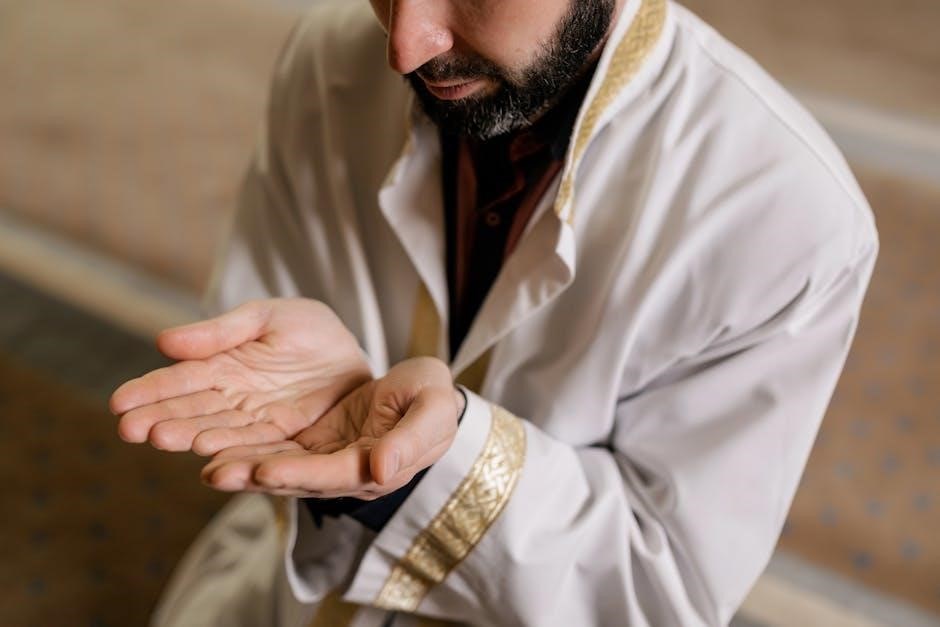
Dua Qunoot is a significant Islamic supplication, often recited during specific prayers like Witr. It seeks Allah’s help, forgiveness, and guidance, emphasizing reliance on Him. Available as PDF, it includes Arabic text, transliteration, and English translation for easier learning and memorization.
What is Dua Qunoot?
Dua Qunoot is a significant supplication in Islam, typically recited during specific prayers such as the Witr prayer, especially in the second half of Ramadan. It is a prayer that seeks Allah’s help, forgiveness, and guidance, emphasizing reliance on Him. Available in PDF format, it includes the Arabic text, its English translation, and transliteration, making it easier for learners to memorize and recite correctly.
There are different types of Qunoot supplications, with the most common being Dua Qunoot, which is generally recited during the Witr prayer. Another notable form is Qunoot Nazilah, which is specifically recited during times of hardship or calamity to seek Allah’s assistance and relief.
Dua Qunoot is characterized by its focus on asking for forgiveness, expressing humility, and seeking divine guidance. It serves as a means to deepen one’s connection with Allah, emphasizing submission and obedience to His will. The supplication typically includes praises to Allah, requests for blessings, and prayers for protection.
In essence, Dua Qunoot is a heartfelt prayer that strengthens a Muslim’s relationship with Allah, providing spiritual solace and a sense of reliance on Him during both prosperity and adversity. The availability of PDF resources has made it more accessible for individuals to learn and incorporate this supplication into their daily prayers, enhancing their worship experience.
Importance of Dua Qunoot in Islam
Dua Qunoot holds a revered position in Islamic worship, serving as a powerful supplication for seeking Allah’s mercy, forgiveness, and guidance. It is a means to express humility and reliance on Allah, emphasizing trust in His divine plan and providence. This prayer is particularly significant during challenging times, as it provides solace and strengthens one’s faith;
Reciting Dua Qunoot is considered a Sunnah, especially during the Witr prayer, and is highly recommended by Islamic scholars. It not only deepens the connection with Allah but also fosters a sense of community among believers, as it is often recited collectively in congregational prayers. The supplication is rich in meaning, asking for protection, blessings, and the strength to adhere to the right path.
The availability of Dua Qunoot in PDF format has made it more accessible, allowing individuals to learn and recite it accurately. This practice is not only a spiritual act but also a way to seek comfort and reassurance in both prosperity and adversity, reflecting the essence of Islamic worship and devotion. Its significance lies in its ability to nurture a deeper spiritual relationship with Allah, making it a cherished part of Islamic prayer rituals.
When and How to Recite Dua Qunoot
Dua Qunoot is typically recited during the Witr prayer, especially in the third rakat. It is recommended to recite it before or after ruku, depending on scholarly recommendations. This supplication is a cherished part of Islamic prayer rituals.
Specific Prayers for Recitation
Dua Qunoot is primarily associated with the Witr prayer, a recommended prayer performed at night. It is most commonly recited in the third rak’ah of Witr, either before or after the ruku’ (bowing), depending on the Islamic scholarly opinion one follows. Additionally, Dua Qunoot is also recited during the Fajr (Dawn) prayer, particularly in the second rak’ah. This practice is considered a Sunnah, emphasizing its significance in seeking Allah’s assistance and forgiveness. The supplication is also recommended during times of hardship or calamity, as it serves as a means of seeking divine help and relief. The PDF resources available provide clear guidance on when and how to incorporate Dua Qunoot into one’s prayer regimen, ensuring that Muslims can perform it correctly and benefit from its spiritual rewards.
Step-by-Step Guide to Recitation
Reciting Dua Qunoot involves a specific method to ensure its proper execution. Begin by performing the Witr prayer, typically consisting of three rak’ahs. In the third rak’ah, after the second prostration (sajdah), stand up and raise your hands in supplication. Start by praising Allah and acknowledging His sovereignty. Recite the Dua Qunoot in Arabic, either from memory or using a PDF guide for accuracy. Ensure correct pronunciation by following the transliteration provided in the resources. After completing the Dua, lower your hands and seek forgiveness by saying “Astaghfirullah” three times. Conclude with a brief prayer for protection and blessings; If desired, add additional supplications or Quranic verses, such as the Qunoot Shabani, before bowing (ruku’). This structured approach ensures the recitation aligns with Islamic teachings and maximizes its spiritual impact.

Transliteration and Translation
Dua Qunoot is available in PDF format, offering the Arabic text alongside its transliteration and English translation. This aids in proper pronunciation and understanding, making it easier for learners to recite and memorize the supplication accurately.
Arabic Text and Transliteration
The Dua Qunoot is readily available in PDF format, which includes the original Arabic text along with its transliteration. This makes it accessible for individuals who may not be fluent in Arabic but wish to recite the supplication accurately. The transliteration is written in Latin script, breaking down each word phonetically to ensure proper pronunciation. For example, the opening of the Dua Qunoot is transliterated as: Allahumma lakal-hamdu, anta noorus-samaawaati wal-ardi wa man feehinna. This transliteration system is consistent throughout the document, making it easier for learners to practice and memorize the Dua. The PDF also includes diacritical marks to guide pronunciation further. Such resources are particularly beneficial for non-native Arabic speakers who want to engage deeply with the supplication. The inclusion of both the Arabic text and its transliteration ensures that the spiritual and linguistic essence of the Dua Qunoot is preserved for all reciters.
English Translation for Understanding
The English translation of Dua Qunoot is provided in the PDF to help individuals understand the profound meaning of the supplication. It serves as a vital tool for those who may not be fluent in Arabic but wish to connect deeply with the prayer. The translation captures the essence of the Dua, allowing readers to reflect on its spiritual significance. For instance, the opening lines, translated as Praise belongs to You, Allah, the Light of the heavens and the earth and everyone in them, emphasize Allah’s omnipresence and majesty. This translation ensures that the supplicant can comprehend the heartfelt requests for guidance, forgiveness, and protection embedded in the Dua. By studying the English version, one can better grasp the theological concepts and emotional depth of the prayer, fostering a stronger spiritual connection. The PDF’s inclusion of both the Arabic text and its English translation makes it an invaluable resource for personal reflection and communal worship alike. This dual representation ensures that the Dua Qunoot remains accessible and meaningful for all who seek to recite it with understanding and sincerity;

Benefits and Significance
Dua Qunoot offers profound spiritual benefits, seeking forgiveness, guidance, and protection from Allah. It strengthens faith, fosters reliance on Allah, and provides comfort during hardships. Reciting it regularly enhances one’s connection to Allah, offering peace and clarity in seeking His divine decree.
Spiritual Benefits of Reciting Dua Qunoot
Reciting Dua Qunoot offers numerous spiritual benefits, deeply enriching one’s connection with Allah. It serves as a heartfelt plea for forgiveness, guidance, and protection, fostering a sense of humility and reliance on Allah’s mercy. By invoking Allah’s help, believers seek refuge from hardships and adversities, finding solace in His divine decree. The supplication also strengthens faith, encouraging believers to trust in Allah’s wisdom and justice. Regular recitation cultivates gratitude, as it acknowledges Allah’s blessings and sovereignty over all aspects of life. Additionally, Dua Qunoot is a means to express devotion, reinforcing the belief that worship and service are solely for Allah’s pleasure. Its recitation during specific prayers, such as Witr, enhances the spiritual experience, providing a moment of introspection and renewal. Overall, Dua Qunoot is a powerful tool for spiritual growth, offering comfort, clarity, and a deeper understanding of Allah’s presence in one’s life.
Seeking Forgiveness and Guidance
Dua Qunoot is a profound supplication that emphasizes seeking Allah’s forgiveness and guidance. It serves as a heartfelt plea to Allah, expressing remorse for past mistakes and asking for divine pardon. The supplication begins with praise and acknowledgment of Allah’s sovereignty, followed by a humble request for forgiveness and protection from evil. Believers are encouraged to reflect on their actions and seek Allah’s mercy, fostering a sense of accountability and spiritual growth. The dua also seeks guidance, imploring Allah to lead the believer on the right path and grant them wisdom in decision-making. By reciting Dua Qunoot, individuals cultivate a deeper connection with Allah, expressing their reliance on His mercy and grace. This supplication is particularly significant during challenging times, as it provides comfort and reassurance of Allah’s presence and support. Through its heartfelt words, Dua Qunoot becomes a means to seek not only forgiveness but also the strength to navigate life’s trials with faith and resilience.

Downloads and Resources
Various resources are available for Dua Qunoot, including PDF downloads containing Arabic text, transliteration, and English translations. Audio recitations are also accessible to aid in proper pronunciation. These resources are compiled by scholars and are free to download for personal use.
PDF Downloads for Dua Qunoot
Several resources offer Dua Qunoot in PDF format, providing the Arabic text, transliteration, and English translation. These documents are designed to aid Muslims in learning and memorizing the supplication. Compiled by scholars like Sheikh Mashari Rashid Al-Afasy, they include clear layouts and explanations to enhance understanding.
The PDF files are widely available for free download on Islamic websites and platforms. They often feature the complete prayer, making it easier for individuals to recite during specific prayers like Witr. Some versions also include audio links for proper pronunciation guidance, ensuring accuracy in recitation.
These PDF resources are particularly beneficial for those seeking to deepen their spiritual practice. They serve as a convenient tool for personal use, teaching, or sharing within communities. The availability of these downloads highlights the importance of Dua Qunoot in Islamic worship and its universal appeal among believers.
Audio Recitations for Proper Pronunciation
Audio recitations of Dua Qunoot are widely available online, offering a valuable resource for learners to master proper pronunciation. These recordings feature experienced reciters, such as Sheikh Mashari Rashid Al-Afasy, who deliver the supplication with precision and emotional depth. Listeners can follow along with the Arabic text, ensuring accurate recitation.
Many websites and Islamic platforms provide these audio files, often accompanied by PDF downloads for a comprehensive learning experience. The recordings are particularly useful for non-Arabic speakers or those new to the prayer, helping them mimic the correct intonation and rhythm. Additionally, audio recitations are ideal for practicing during prayers like Witr, ensuring a devout and meaningful experience.
These audio resources are easily accessible on platforms like YouTube and Islamic websites, making it simple for anyone to enhance their recitation skills. By listening and repeating, individuals can confidently incorporate Dua Qunoot into their worship, fostering a deeper connection with the supplication’s spiritual significance.
Cultural and Historical Context
Dua Qunoot holds deep cultural and historical significance, rooted in Islamic tradition. Originating from Prophet Muhammad (PBUH), it reflects the community’s spiritual practices and reliance on divine guidance, particularly during challenging times.
Origins and History of Dua Qunoot
Dua Qunoot traces its origins to the Prophet Muhammad (PBUH), who taught this supplication to his companions. It is deeply rooted in Islamic tradition, serving as a means to seek Allah’s help and forgiveness. The supplication gained prominence during times of tribulation, as it embodies the community’s reliance on divine guidance. Historically, scholars like Imam Bukhari and Abdullah ibn Mubarak have provided interpretations, further solidifying its importance. The PDF documents available today, such as those compiled by Sheikh Mashari Rashid Al-Afasy, preserve the Arabic text, transliteration, and English translation, making it accessible for memorization and practice. This supplication remains a vital part of Islamic prayers, particularly during the Witr prayer, reflecting the enduring legacy of the Prophet’s teachings.
Different Types of Qunoot Supplications
There are various forms of Qunoot supplications, each serving distinct purposes and circumstances. One prominent type is Qunut Nazilah, which is specifically recited during times of hardship, war, or oppression. It is a heartfelt plea to Allah for relief and victory. Another notable form is the Dua Qunoot recited in the Witr prayer, particularly in the second half of Ramadan. This supplication emphasizes seeking forgiveness, guidance, and divine protection. Additionally, there is Dua Qunoot for regular prayers, such as the Subuh (morning) prayer, which focuses on praising Allah and seeking His assistance. These variations highlight the adaptability of Qunoot in addressing different spiritual and situational needs. The PDF documents available online often include multiple versions, allowing individuals to choose the most appropriate supplication for their circumstances. This diversity ensures that the practice remains relevant and meaningful across various contexts, reinforcing its significance in Islamic worship.
Personal Reflections and Applications
Reciting Dua Qunoot fosters a deep connection with Allah, helping believers seek divine help and express gratitude. It encourages self-reflection, humility, and trust in Allah’s plan, making it a powerful tool for personal spiritual growth.

In daily life, Dua Qunoot can be recited to stay grounded, especially during challenges; It reminds us of Allah’s sovereignty and mercy, fostering a sense of reliance on Him. Regular recitation can transform one’s mindset and actions, aligning them with Islamic values.
Connecting with Dua Qunoot Personally
Connecting with Dua Qunoot personally involves understanding its profound meanings and allowing its words to resonate deeply within the heart. This supplication is not just a ritual but a heartfelt conversation with Allah, expressing humility, gratitude, and reliance on His mercy. By reciting it with focus and sincerity, one can experience a sense of peace and spiritual upliftment.
Many find comfort in Dua Qunoot during challenging times, as it serves as a reminder of Allah’s sovereignty and grace. The act of seeking forgiveness and guidance through this supplication fosters a deeper connection with one’s faith. Additionally, reflecting on its themes—such as divine help, protection, and blessings—can inspire personal growth and a stronger bond with Allah.
Using resources like the Dua Qunoot PDF can enhance this connection, as it provides clarity and accessibility to the supplication’s text, transliteration, and translation. This makes it easier for individuals to engage with the prayer meaningfully, regardless of their Arabic proficiency.
Practical Tips for Effective Supplication
To recite Dua Qunoot effectively, it is essential to focus on both the outward and inward aspects of the supplication. Begin by understanding the meaning of the words, as this enhances the connection with the prayer. Use resources like the Dua Qunoot PDF to access the Arabic text, transliteration, and translation, which aids in proper pronunciation and comprehension.
Ensure sincerity and concentration during recitation, avoiding distractions. Recite with a calm and humble tone, reflecting the humility and reliance on Allah embedded in the supplication. Additionally, maintain the correct posture and timing, as Dua Qunoot is typically recited during specific prayers like Witr or Subuh.
Consistency is key; incorporate Dua Qunoot into your regular prayer routine to foster a deeper spiritual practice. Finally, seek guidance from scholars or knowledgeable individuals to refine your recitation and understanding, ensuring adherence to Islamic teachings.
Dua Qunoot is a profound supplication for seeking Allah’s help and forgiveness. Its availability in PDF format makes it accessible for learning and recitation. Regular practice enhances spiritual growth, fostering a deeper connection with Allah and His guidance.
Dua Qunoot is a significant supplication in Islam, often recited during specific prayers like Witr. It is a heartfelt plea to Allah for guidance, forgiveness, and protection. The supplication emphasizes reliance on Allah, expressing gratitude and seeking His help in all aspects of life.
The Dua Qunoot is available in PDF format, which includes the Arabic text, English translation, and transliteration, making it easier for learners to memorize and recite correctly. It is typically recited during the Witr prayer, either before or after the Rukoo (bowing), depending on the scholarly opinion.
The supplication is rich in meaning, asking Allah to grant guidance, healing, and blessings. It also seeks refuge in Allah from harm and evil, reinforcing the belief in His sovereignty and mercy. Regular recitation of Dua Qunoot is encouraged as it strengthens one’s spiritual connection and fosters a sense of humility and dependence on Allah.
Resources like PDF downloads and audio recitations are widely available, helping individuals learn and practice the Dua Qunoot effectively. These resources are particularly useful for those seeking to incorporate this beautiful supplication into their daily prayers.
In essence, Dua Qunoot is a powerful tool for seeking Allah’s assistance and expressing devotion, making it a cherished part of Islamic worship.

Encouragement for Regular Recitation
Regular recitation of Dua Qunoot is highly encouraged in Islamic practice as it strengthens one’s spiritual connection with Allah. This supplication, rich in meaning, serves as a heartfelt plea for guidance, forgiveness, and protection, making it a powerful tool for seeking Allah’s mercy and blessings.
By incorporating Dua Qunoot into daily prayers, particularly during the Witr prayer, believers can cultivate a deeper sense of humility and reliance on Allah. It is a beautiful way to express gratitude, seek refuge from harm, and reaffirm one’s faith. The availability of Dua Qunoot in PDF and audio formats makes it accessible for everyone to learn and recite correctly, ensuring its benefits are widely attainable.
Consistent recitation fosters a sense of closeness to Allah, helping individuals navigate life’s challenges with faith and resilience. It is a profound way to seek divine assistance and enlightenment, making it a cherished practice among Muslims. Embrace this supplication as a regular part of your worship to experience its transformative power.
Let Dua Qunoot be a cornerstone of your spiritual routine, a constant reminder of Allah’s grace and your dependence on Him.